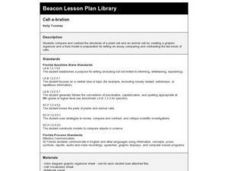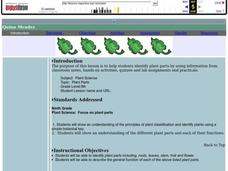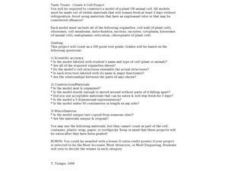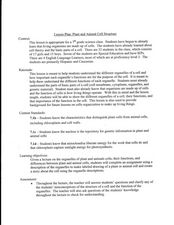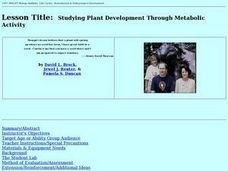Curated OER
Cells
In this biology activity, students use the clues given at the bottom of the sheet to complete the crossword puzzle on cells. There are 22 clues to solve in the puzzle on cells.
Curated OER
Cell-a-bration
Fifth graders study the structures of a plant cell and animal cell. They create a graphic organizer and a food model. Finally, they write an essay comparing and contrasting plant and animal cells.
Curated OER
A View of the Cell
In this cell worksheet, learners will match 13 vocabulary words relating to cells to the correct definition. The cell vocabulary words cover all the parts of the cell plus eukaryotes, and prokaryotes.
Curated OER
Reviving Celery
The classic in-class demonstration using celery dipped into water with food coloring is the highlight of this biology lesson plan. Young scientists discover that organisms are made up cells and have distinguishing characteristics. After...
Casimir Middle School
Biological Classification Worksheet
Classify living things with a set of worksheets that has pupils sorting and indentifying living and non-living things. Learners use the worksheets as a basis for finding their answers.
Curated OER
Regents High School Examination: Living Environment 2010
This exam touches upon every topic within the typical first year biology course.. A broad variety of question styles give high schoolers every opportunity to show what they know. Why start from scratch when a comprehensive final exam is...
Forest Foundation
The Nature of Trees
Young botanists examine the different parts of tress and then draw parallels between the functions of these parts and the function of parts of the human body.
Curated OER
Plant Parts
Ninth graders identify plant parts by using different classification methods. For this plant lesson students observe and draw different types of leaves then classify them according to species.
Curated OER
Cell Theory, Plant And Animal Cell Comparison
Tenth graders study plant and animal cells. In this investigative lesson students draw their own animal cells and label them.
Curated OER
Living Environment
For this environment worksheet students complete a series of multiple choice questions and short answers on plant and animal species and populations in an ecosystem.
Curated OER
Green Plants
Beginning botanists are introduced to the world of plants with this PowerPoint. Some of the information is most appropriate for primary learners, such as the needs of a plant. Some of the information, however, is more directed at...
The Science Spot
Flower Basics
Learn about plants and pollination with a worksheet about the parts of a flower. After labeling the anatomy of a flower using a word bank, kids explain the difference between self-pollination and cross-pollination, and unscramble...
K12 Reader
Tissues, Organs and Systems
Young scientists are introduced to the connections among cells, tissues, organs, and systems in a life science reading comprehension worksheet that asks them to respond to a series of questions based on the passage.
Curated OER
Pollination Power
Second graders study and examine the structure of a flower. In this pollination lesson, 2nd graders observe pollinators in the garden and dissect a flower. Students then plant strawberry plants in the garden and observe the process...
LABScI
Photosynthesis: How Do Plants Get Energy?
Examine the mechanism of photosynthesis through different light scenarios. Pupils vary the amount and type of light exposure on plant leaves in the fifth lesson plan in a 12-part series. Through observation, they determine the rate of...
Curated OER
AP: Chapter 36: Transport in Plants
When you need a review activity for your AP biologists on water and nutrient transport in plants, this one is for you! From the simple stuctures involved to the complex mechanisms that make it happen, the details of transport are...
National Energy Education Development Project
Introduction to Hydrogen
Every region has a renewable resource that can be used to make hydrogen. But, what is hydrogen and why can it be used as an energy source? Find out with a presentation that answers these questions and then discusses where hydrogen is...
Curated OER
The Effects of Osmotic Balance and Imbalance In Living Cells
Young scholars investigate osmotic balance in living cells. In this osmotic balance lesson plan, students use elodea leaves to study the effects of salt solutions on the cell. They compare the changes in an elodea leaf with salt water on...
Curated OER
Tasty Treats
In this biology worksheet, students construct a model of a plant or animal cell using edible materials that will remain fresh at least three days. They identify and label each part to include various organelles as listed. Students also...
Curated OER
Plant and Animal Cell Structure
Seventh graders identify the different parts and functions of the cell. In this biology lesson, 7th graders make a labelled diagram of either a plant or animal cell. They write a story about it.
Curated OER
Seeing Cells
Sixth graders study living cells and their functioning units. In this cell lesson students color cell diagrams, answer questions and discuss the differences between plant and animal cells.
Curated OER
The Giant Cell
After actively participating in a unit on cells, the middle schoolers act out and become the organelles. They will act out and explain the functions of what each of the organelles do for the cell.
Curated OER
The Cell Theory
In this cells learning exercise, students review how the cell theory was developed. Students review the structure and function of cell structures and active transport. This learning exercise has 30 fill in the blank questions.
Curated OER
Studying Plant Development Through Metabolic Activity
A hands-on activity which allows learners to learn about cellular respiration. This lesson contains a range of investigations testing the rates of cellular respiration to demonstrate the relationship between metabolic rates of...



